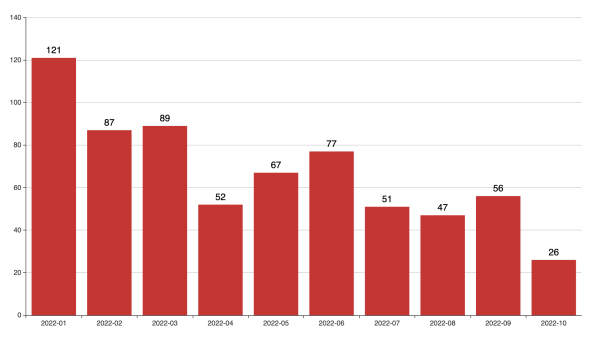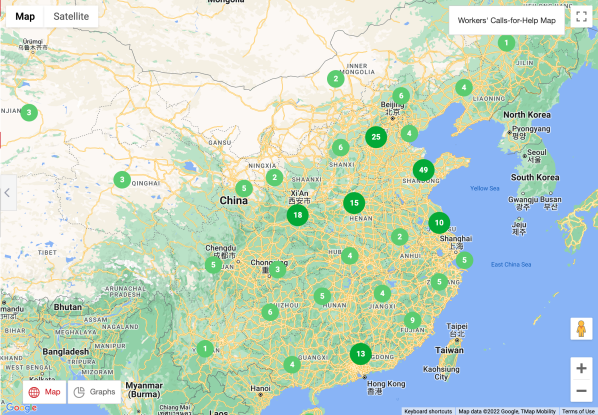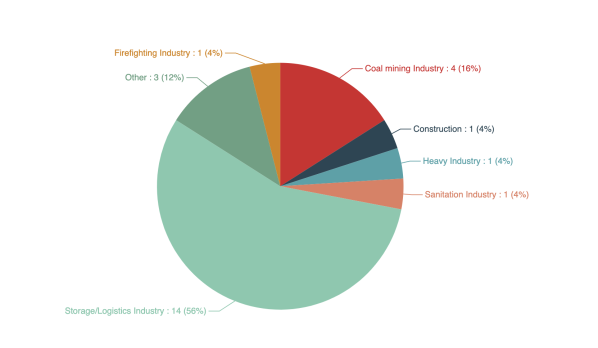
Photograph: chinahbzyg / Shutterstock.com
China Labour Bulletin’s mapping data collected in October 2022 shows that wage arrears for employees of educational institutions, such as English and arts schools, are common across the country. This comes on the heels of government regulations on private tutoring last year, plus the pandemic's effects on in-person learning.
But first, don’t miss the content CLB published last month:
- Workers unable to recover even small sums from contractors amid property market freefall. In this case study of a construction worker in Aksu, Xinjiang Uyghur Autonomous Region, CLB looks at how regulations designed to protect the labour rights of migrant workers go unheeded even when workers need the most protection. A migrant worker surnamed Dai was owed 6,000 yuan for a job he completed last November, but he had difficulty recovering even this small amount. Subcontracting in the construction industry leaves workers with no recourse against those higher up the chain, even though regulations stipulate that general contractors do have liability for wages owed lower down; workers often do not know the identities of contractors and do not have signed labour contracts.
- State-owned bus company in debt, asks employees to take out personal loans to cover unpaid wages. Many local governments are struggling to pay wages of essential workers, including bus drivers. In the city of Lanzhou, Gansu province, the heavily-indebted bus company came up with a novel and illegal solution of workers taking out personal loans to try to bridge the wage gap until salaries began being paid in late October. A worker's family member said, “If the enterprise itself cannot handle the loan for various reasons, there is a risk of not being able to repay the loan. Who else will take over?” CLB called the municipal union and the state-owned bus company to find out more, and we discovered that recent provincial union visits to the workplace likely did not result in hearing workers’ genuine concerns about their wage arrears and other matters. Moreover, we could not receive confirmation that all of the salaries had been paid in full.
- September 2022 labour news roundup: Peak season labour shortage in manufacturing sector. Also in this issue: tech companies eliminate overtime pay for contractual workers; government circular signals possible pay cuts at financial sector SOEs; smaller cities unable to support local bus routes, leaving drivers unpaid; young lawyer takes own life in the face of harsh legal work culture; air conditioning installation accidents surge this summer.
Education sector companies unable to pay teachers, student fees misappropriated
In October, CLB’s mapping data shows a number of incidents of wage arrears at English and arts schools across China. One example is that on 29 October, at an art school in Xi’an, Shaanxi province, employees complained of not being paid for two months, plus their social security hadn’t been paid for half a year and holiday wages were deducted. The company asked the employees to reallocate how teachers spent student funds, causing parents to pay additional fees on performance evaluations. Even worse, the school changed its legal name in an attempt to avoid liability.
Wage arrears were also reported by workers at a dance school in Xi’an and a music school in Yantai, Shandong province, and art schools in Wuhan, Hubei province; and Chengdu, Sichuan province. Educational institutions in China have been suffering not only because their activities were disrupted because of the pandemic, but also because of national policies regulating private tutoring. These hardships have led to over 300,000 institutions closing down as of the end of 2021, according to China Youth Daily.
China’s official trade union should actively represent educational sector employees and help them recover their wages. Article 27 of the Labour Law outlines the legal protections for workers when a company engages in mass layoffs or goes bankrupt and mentions the role of the trade union. Under the law, the company must give notice 30 days in advance to the trade union or to workers, hold a consultation, and report to the local labour bureau before proceeding. The trade union should seek for the enterprise to explain its operating conditions and financial situation for the purpose of holding the company accountable to pay workers for labour performed and uphold the terms of their labour contracts.
However, in the case of the art school in Xi’an, CLB could not find any information on the municipal federation of trade union’s website regarding supporting workers of educational institutions, even though the sector has been affected for over one year. Rather, much of the online material is about boosting the business environment in the region. A real trade union must protect the most basic rights and interests of workers, especially the payment of wages.
China Labour Bulletin Mapping Data



